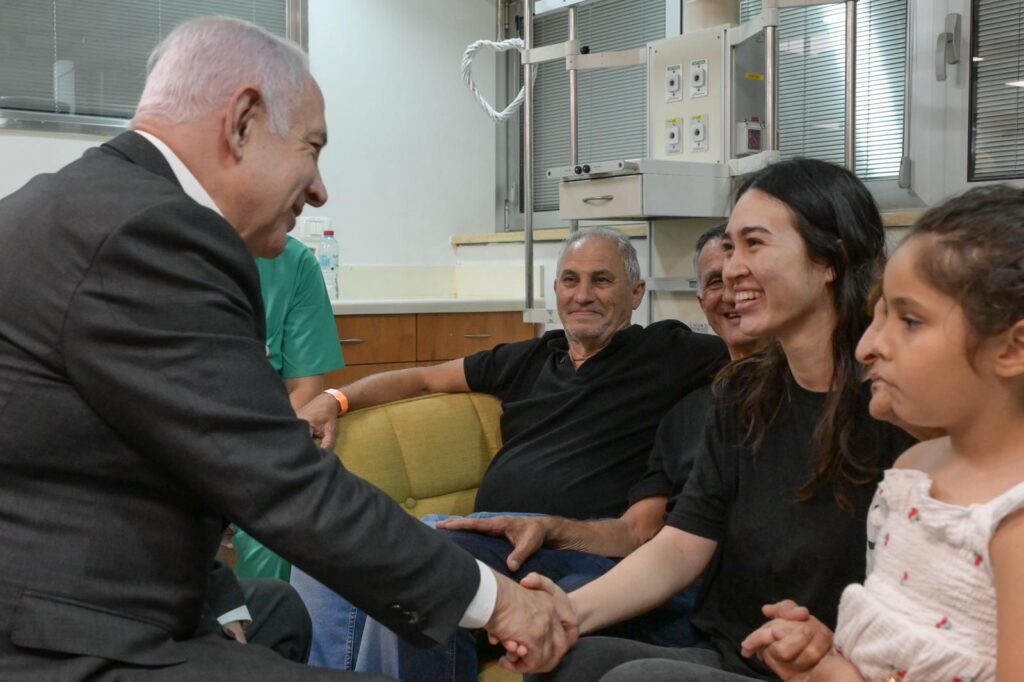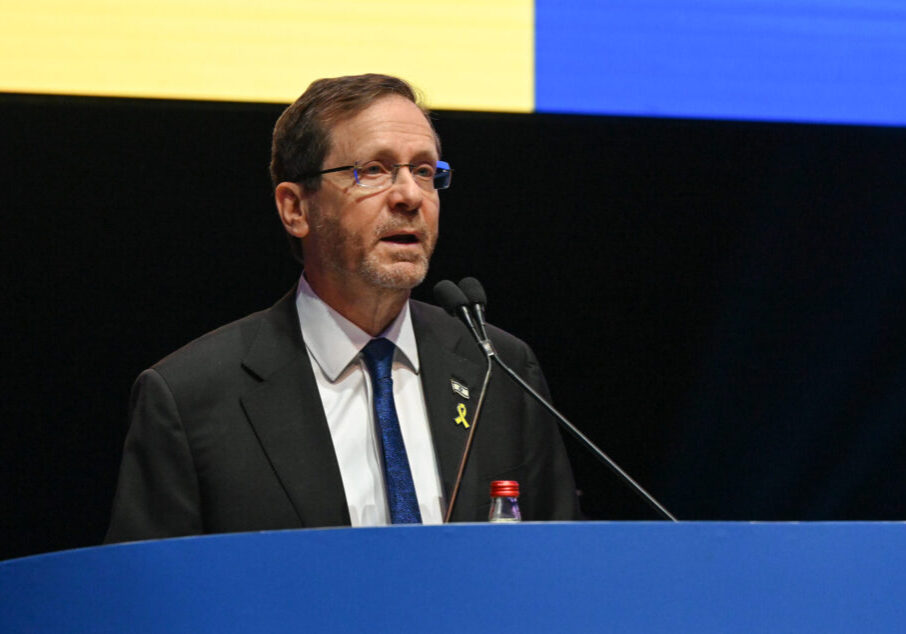Australia/Israel Review
Behind the News – July 2024
Jul 2, 2024 | AIJAC staff

ROCKET AND TERROR REPORT
As of June 10, more than 19,000 rockets and other projectiles have been fired at Israel since October 7, according to the IDF, most from Gaza, but also from Lebanon, Iran, Yemen, Iraq and Syria. This includes several rockets launched sporadically from Gaza between May 26 and June 24. That number doesn’t include the hundreds of rockets that have misfired and landed in Gaza or numerous anti-tank missiles fired from Lebanon.
Since the start of ground operations, 315 Israeli soldiers had been killed in Gaza as of June 23.
Terror attacks in the West Bank since mid-May included a car-ramming attack that killed two IDF soldiers on May 29 and IED attacks in Jenin that killed one soldier and wounded more than a dozen on June 27.
ISRAELI COMMANDOS RESCUE FOUR HOSTAGES
On June 9, Israeli commandos rescued four hostages, Noa Argamani, Almog Meir Jan, Andrey Kozlov and Shlomi Ziv, in a daring daylight mission in the dense Nuseirat refugee camp in northern Gaza. The hostages were held in two separate buildings, with three of them held by the family of a journalist who wrote for Al Jazeera. The rescue operation initially achieved complete surprise, but then dozens of Hamas terrorists attacked the fleeing hostages and rescuers with gunfire and rocket-propelled grenades, prompting the Israeli Air Force to strike dozens of targets to cover the escape. The intense firefight resulted in significant casualties, with Hamas health authorities claiming 274 Gazans killed, but Israel disputed these numbers, saying perhaps 100 people were killed, many of them terrorists. Chief Inspector Arnon Zamora from the Israel Police’s elite Yamam counter-terrorism unit was killed leading one of the rescue teams.
RAFAH OPERATION TO END SOON
Six weeks after Israel began its operations in Rafah on May 6 in an effort to destroy Hamas’ last Gaza stronghold, Israeli officials have announced that they are now close to achieving their goals there, and the Gaza conflict is now likely to shift to a less intense phase. The IDF reports that most of Hamas’ remaining battalions in Rafah have been destroyed, its military infrastructure, including the remaining weapons factories, dismantled and weapon supplies coming in through numerous smuggling tunnels from Egypt now blocked.
NEW UN STUDIES CONTRADICT GAZA FAMINE CLAIMS
The UN’s Famine Review Committee (FRC) released a report on June 8 concluding that it could not endorse previous UN reports forecasting famine in northern Gaza, saying the predictions of famine were “not plausible” given the available evidence. The FRC report showed that from February to April, humanitarian assistance entering Gaza included more than 100% of daily calorie requirements for the population.
A subsequent report released on June 25 by the UN-linked Integrated Food Security Phase Classification (IPC) organisation agreed, saying, “The available evidence does not indicate that Famine is currently occurring.”
UN ADMITS NOT COUNTING ALL GAZA AID TRUCKS
The UN Office for the Coordination of Humanitarian Affairs’ May 24 bulletin admitted that the UN does not count all humanitarian aid trucks that enter Gaza – for instance, excluding commercial trucks. According to a separate report from Israel’s Coordination of Government Activities in the Territories (COGAT), the UN is also not counting aid arriving through recently opened northern crossings into Gaza and the US-built pier, and the UN only counts aid it distributes, ignoring that from other agencies. This has led to huge discrepancies in aid counts, with COGAT counting 6,359 aid truckloads entering Gaza in May, and the UN counting only 1,479.
UN NOT USING AID CORRIDOR ESTABLISHED BY ISRAEL
On June 16, COGAT announced that as part of efforts to increase the volumes of humanitarian aid entering Gaza, a pause in military activity would take place along the road that leads northwards into Rafah from the Kerem Shalom crossing from 8 am to 7 pm daily until further notice, to facilitate delivery of aid. Despite this, failure to collect and distribute aid has led to a backlog of aid trucks waiting inside Gaza. For example, on June 20, COGAT said 324 aid trucks were transferred to Gaza via the Kerem Shalom Crossing, but only 80 trucks were collected, and some 1,200 truckloads overall were sitting inside Gaza awaiting collection. UN officials claim they cannot fully utilise the new aid corridor due to safety concerns, while Israel says that its forces can ensure the safety of aid convoys along it.
HAMAS REJECTS UNSC CEASEFIRE RESOLUTION
On June 10, the United Nations Security Council voted 14-0 to approve a US-sponsored resolution endorsing the three-phase ceasefire plan for Gaza announced by President Joe Biden on May 31. Russia abstained. The plan, which the resolution specifically said Israel had accepted, would begin with a complete ceasefire for six weeks, during which Israeli forces would withdraw from Gaza’s populated areas and Hamas would release all children, women, elderly and wounded hostages. Palestinians would be allowed to return to their homes. Following additional negotiations, phase two would see a permanent halt to the violence, total Israeli withdrawal from Gaza and return of the remaining hostages, followed by a phase of reconstruction.
On June 12, US Secretary of State Antony Blinken said Hamas’ response to the proposed deal included “numerous changes to the proposal… Some of the changes are workable, some are not.” Other US officials subsequently made it clear that Hamas’ “changes” – including that Israel must remove all troops from Gaza and agree to a permanent ceasefire before any hostages are released – amounted to rejection of the deal.
HEZBOLLAH REPORTEDLY STORING WEAPONS AT BEIRUT AIRPORT
A British newspaper report quotes Lebanese whistleblowers alleging that Hezbollah is using Beirut’s international airport to store large quantities of Iranian weapons, including ballistic missiles, unguided artillery rockets and the toxic explosive RDX. An airport worker alleges the weapons arrive on flights from Iran in “mysterious large boxes.”
IRAN EXPANDS NUCLEAR ENRICHMENT
The May 2024 reports by the International Atomic Energy Agency (IAEA) indicate that Iran’s enriched uranium stockpiles reached 6.2 tonnes, an increase of 678 kg from February. Iranian 60%-enriched uranium stocks – which are near military grade – stand at 210 kg, 20 kg more than three months earlier.
On June 6, the IAEA Board of Governors passed a resolution criticising Teheran and calling on it to allow the resumption of monitoring of Iran’s atomic sites.
Furthermore, the IAEA has confirmed that Iran is installing new uranium enrichment cascades at the underground Fordow facility and at Natanz, where another enrichment plant is also possibly being built. Experts estimate that Iran can now produce enough fissile material for several atomic warheads every month.
Meanwhile, senior Israeli and US officials were reportedly examining new intelligence in mid-June suggesting that Iranian experts have conducted computer modelling relevant to the development of atomic bombs.
CANADA LISTS IRGC
After years of debate, Canada announced on June 19 that it was listing Iran’s Islamic Revolutionary Guard Corps (IRGC) as a terrorist organisation under its Criminal Code, becoming the second Western nation to proscribe the group. The US listed it in 2019.
Stranger than Fiction
BDS GOES OFF TRACK
The BDS National Committee, which heads the Boycott Divestment and Sanctions campaign against Israel, tends to react with fury when its self-righteous demands to boycott both Israel and anyone dealing with Israel are ignored. So, it must have been positively apoplectic when the Palestinian Authority (PA) itself was a transgressor.
The heavy machinery company Caterpillar has long been a favourite BDS target, because the Israeli military uses its bulldozers and other machines, including to demolish the houses of terrorists. Yet in early June, the Palestinian Ministry of Local Government published a post that not only had a Caterpillar machine front and centre, but showed the PA Minister for Local Government climbing on it – smiling!
The actual event was an inauguration ceremony thanking the Japanese Government for donating the machinery to help deal with solid waste. However, the fact that someone else paid for the transgression held no water with BDS National Committee Chair, Mahmoud Nawajaa. He accused the Minister of crossing the “BDS picket line” and, with the level of understatement typical of the BDS crowd, added, “The entire world is boycotting and divesting from the American company Caterpillar, which is involved in the crime of genocide in Gaza and the destruction of our homes everywhere! While the Palestinian Ministry of Local Government buys equipment worth 5 million shekels from it! It seems that the current government, with all its ministers of Canadian, British, and American nationalities, lives in a parallel world!”
It’s not as though the BDS principals are themselves so principled, however. Founder and leader Omar Barghouti earned a degree from Tel Aviv University! And Nawajaa most likely posted his comments on a phone or computer using Israeli technology.






